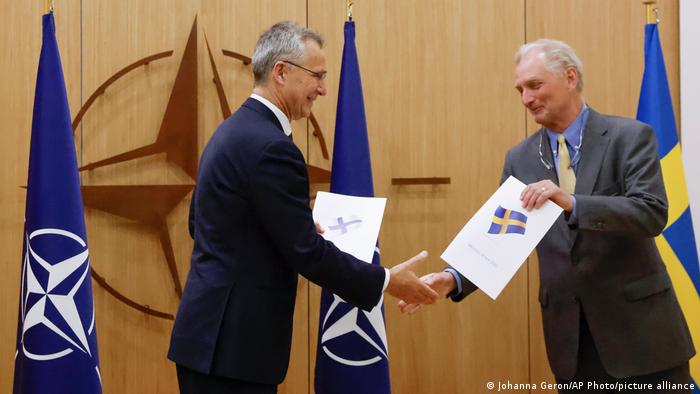« Turkey has said it is willing to delay Swedish and Finnish membership of Nato for more than a year unless it receives satisfactory assurances that the two Nordic countries are willing to address support for Kurdish groups it regards as terrorist organisations » reports Patrick Wintour in The Guardian.
Finland’s prime minister said on Tuesday that the two nations’ Nato applications could stall if the issue is not resolved before a vital Nato summit due to start in Madrid on 29 June.
Turkey accuses Sweden and Finland of harbouring alleged members of the Kurdistan Workers’ party (PKK) and also objects to their decisions in 2019 to ban arms exports to Ankara due to Turkey’s military operations in Syria.
Turkey has gone on a public diplomacy offensive to highlight Swedish support for Kurdish groups in northern Syria that it links to the PKK – designated as a terrorist organisation in the EU, US and Turkey – and is planning to stage a fringe meeting on the issue at the Nato summit.
“This is a matter of vital national interest, and we are prepared to prevent their membership for as long as a year if necessary,” said Akif Çağatay Kılıç, an MP for the ruling Justice and Development party (AKP) and chair of the Turkish parliament’s foreign affairs committee. “Turkey is the second largest army in Nato and has been providing the drones that help Ukraine defend itself. We deserve greater respect.”
He said Turkey respected its own duties and responsibilities to the alliance. “What are [Sweden and Finland] going to do? They have been harbouring terrorist organisations that kill my people, disrespect my borders, pose an existential threat to my country. The only thing we demand is that there are no distinctions. A terrorist organisation is a terrorist organisation.”
He denied the crisis was an attempt to fan nationalist flames before difficult elections, saying the non-Kurdish opposition parties were supportive of the stance of the president, Recep Tayyip Erdoğan. He also said there was no attempt to barter with the US over arms deals.
During a visit to Sweden on Tuesday, Finland’s prime minister, Sanna Marin, warned: “If we don’t solve these issues before [the] Madrid [summit], there is a risk that the situation will freeze.
“We don’t know for how long but it might freeze for a while.”
Jens Stoltenberg, the Nato secretary general, has praised Swedish efforts to address Turkey’s concerns, but seems to have recognised that plans for a fast-track membership may now be disappearing.
Advertisement
The Swedish prime minister, Magdalena Andersson, is due to attend the summit, which may end up being a show of division as much as it is concerned with long-term strategic thinking and enlargement. Privately, western officials admit that Germany, France and the US are not keen to have Ukraine dominate the summit, although it is hard to imagine Nato support for Kyiv not being the central issue.
On Friday Sweden tried to mollify Turkey by publishing a foreign policy paper that highlighted the need to fight terrorism, and opened a path for Sweden to resume arms export sales to Turkey. Sweden imposed restrictions on arms sales in 2019 after Turkey’s invasion of northern Syria. Britain has already lifted the sales ban.
The policy paper said Sweden would “contribute to all of Nato’s security including that of Turkey”. A tougher anti-terrorism law, due to come into force on 1 July, gives the Swedish intelligence services greater latitude to monitor communications of suspected terrorist sympathisers.
Although Turkish demands can vary, officials have said they want to see specific Kurdish activists deported to Turkey, as well as the sacking of the Swedish defence minister, Peter Hultqvist, over a 2011 meeting with the PKK, which has been designated as a terrorist organisation in Sweden since 1984.
Ankara would like the two countries to sever ties with the US-backed Syrian Kurdish autonomous administration, which Turkey says has a synonymous leadership to the PKK.
Andersson’s room for manoeuvre is limited, in that she is not going to transform Swedish extradition laws simply to satisfy the threats coming from the Turkish president, and last week she had to rely on the support of a Kurdish Swedish MP and former peshmerga fighter, Amineh Kakabaveh, to survive a narrow confidence vote. The MP says she received unspecified guarantees in return for her vote.
Sweden is home to 100,000 Kurdish refugees.
Turkish diplomats resent suggestions that it did not make its objections to Swedish membership earlier or that it is being hypocritical about the Kurdish issue due to its support for extremist groups elsewhere in the Middle East.
Finland has fewer problems with Turkey, but has said it is unlikely to press ahead with a membership request without Sweden.
Finnish media reported that the country received 10 Turkey-related extradition requests between 2019 and 2022. It granted two of those requests and is processing seven.
While Britain has strong diplomatic ties with Turkey, it has also given security assurances to the two Nordic countries during the potentially dangerous grey period between their application to join Nato and the moment when full membership gives them the alliance’s collective defence protection.
In an effort to find a resolution, the UK’s Europe minister, James Cleverly, is in Turkey this week to meet ministers. Angus Lapsley, the director for Euro-Atlantic security at the Foreign Office, said the UK was working night and day to try to resolve the dispute.
Stoltenberg has said the Madrid summit was never a deadline.
The Guardian, June 14, 2022, Patrick Wintour

